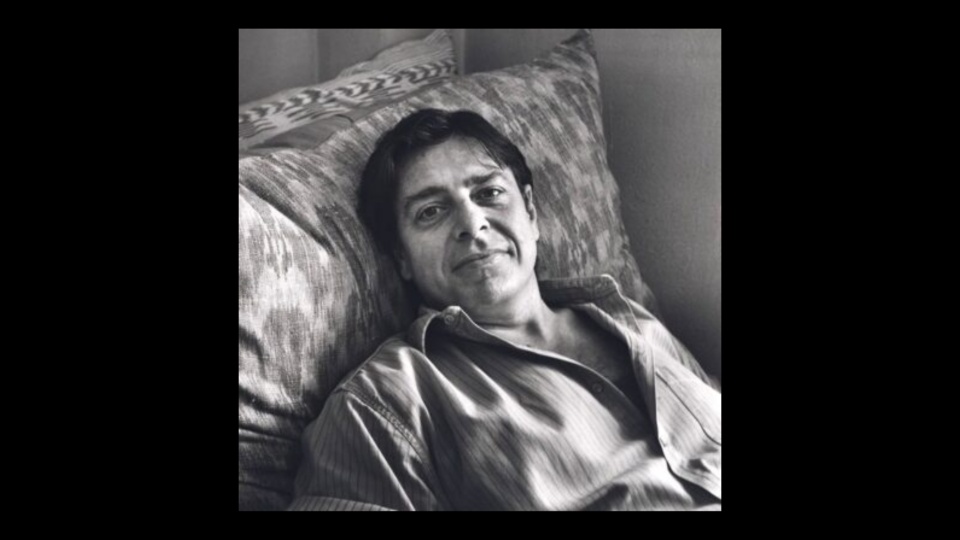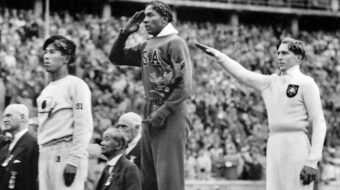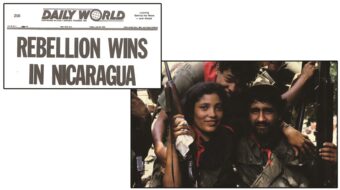
Sadly, this book review is also an obituary and a memoir.
In early 2023, The University of Chicago Press published a collection of Michael Denneny’s writings, On Christopher Street: Life, Sex, and Death After Stonewall. The Gay & Lesbian Review (July-August 2023) is where I first learned of his book—and also read his obituary. He had died, having just turned 80, on April 12, less than a month after the publication date, and already having begun what was to be a tragically foreshortened book tour to promote his latest publication. Just weeks before he died, he live-streamed an author appearance at Washington, D.C.’s Politics and Prose bookstore, which happily has been preserved.
In 1986, my literary agent Frances Goldin started shopping my project for a biography of composer Marc Blitzstein, and no publisher seemed interested. Until, at her request, I also included three finished chapters to show my quality as a writer.
Immediately she heard back from Michael Denneny of St. Martin’s Press. Later, from Michael, I learned that he’d never heard of Blitzstein, but he called his friend, the up-and-coming conductor Bruce Ferden, who knew of Blitzstein and told him, yes, such a biography would make an important contribution.

Michael also doubled the advance he’d originally floated; otherwise, I wouldn’t be able to give it my full time. Was there possibly a mystical explanation for Michael’s openness to this project? Michael and Marc shared a birthday—March 2!
From the Upper West Side, I would bicycle down to the Flatiron Building to meet with Michael, hand over finished chapters, and discuss my progress. I never knew he lived just blocks from me. He was modest, professional, and discreet. Aside from our literary connection, we did not pursue a personal friendship.
Early on, I asked him, “How long a book do you want?”
“There’s never going to be another book about Marc Blitzstein,” he answered, “so yours will always be the standard reference. Include what you believe readers will want to know.” The biography topped out at just over 600 pages. He shared some advice about trimming a manuscript: Cut three lines from every page! Which he did not mean literally, but he did mean there’s fat on every page that you can always eliminate. I continue to look for excess verbiage everywhere, both as a writer and as an editor myself.
Michael assigned my manuscript to an in-house copy editor, who said she’d never encountered the draft of a book that needed virtually no editing! Pleased as I was to hear that, it meant that Michael and I spent little time together working out kinks in the book. I didn’t require the nurturance that other, younger writers might have needed, a topic he addresses intermittently in On Christopher Street.
Once Mark the Music: The Life and Work of Marc Blitzstein was published in 1989, we gradually lost contact. The following year I moved to Los Angeles, and my life started flowing in other directions. He was wrong, it turned out, about mine being the only Blitzstein biography. In 2012, Howard Pollack published his also 600+ page book.
Mindful of how easily important relationships can slip away over time without constant watering, I cherish my brief association with Michael and am grateful that he trusted me with this project which, among other things, added to the world’s appreciation of a significant gay American life.

My book was published in the general St. Martin’s catalog. But Michael pioneered gay fiction and non-fiction in his Stonewall Inn Editions, his claim to fame. Just a few of the writers he published include Ethan Mordden, Christopher Davis, Larry Duplechan, Malcolm Boyd, Paul Monette, Mark Thompson, Randy Shilts, Edmund White, Larry Kramer, John Preston, and Quentin Crisp. His aim was to get gay writing out into the general readership, and published by a mainstream house.
In his collected writings, he frequently compares his lifelong project with the emergence of Black, Jewish, and women writers into the public sphere, which also, in their day, required some heroic efforts on the part of editors and publishers. He wanted to prove that, as with those other authors writing for their communities, gay stories could also find a wider readership. Strangely, there’s little or no mention of the emerging Chicano/a or Latino/a writers, nor Asian-American.
Once AIDS struck, he found out that some of the writers he had contracted could only barely complete their books before the guillotine cut them off in their prime. A desperate urgency characterized the central years of his career, as it did also later, in its own way, when he realized his was a life of the 20th century, and “that the reality of this period was fast sinking into the mists of history, and was in danger of being forgotten.”
His writings, 102 of them, including, for each piece, a “voiceover” from the present identifying the context and concerns of that past era, date from the first generation of gay liberation in the 1970s to the present.
I hasten to add, as Denneny himself reminds us more than once, that for various reasons, he focused his efforts on gay male writers, since women, and lesbian writers in particular, had already paved the way with their own literary magazines and publishing enterprises; and furthermore, because he felt it was not the best idea for a gay male to presume to guide the writing and careers of women writers, much less speak for them. Although, having said which, he was best friends with, and editor, for the phenomenally successful writer Ntozake Shange.
Denneny recounts his years as a founding editor of Christopher Street magazine, named, of course, for the small lane where the Stonewall Inn, the site of the explosive June 1969 rebellion, was located. (It’s now a national historical landmark.) At The University of Chicago, which he attended, he studied with émigré philosopher Hannah Arendt, and cites her liberally on the virtues of a free society:
“Only in the freedom of our speaking with one another, does the world, as that about which we speak, emerge in its objectivity and visibility from all sides. Living in the real world and speaking with one another about it are basically one and the same.”

In the world of gay publishing, especially in its formative decades, reactions from straight critics made a huge difference. Homophobic reviews in The New York Times or The New Yorker, among others, could almost fatally set a promising writer back—what publisher was going to risk signing him on with his next book? The era was just the beginning of a time for open gays or lesbians in academia, people who would positively identify figures such as Michelangelo, Whitman, Verlaine, Proust, Plato, da Vinci, Goethe, Tchaikovsky, or Nikolai Gogol, as homosexual or bisexual in orientation, though such terminology may not have existed in their day.
Denneny advanced his career at a time when such a thing as gay culture hardly existed outside the dimly lit world of homosexual sex. It was that culture that the Stonewall generation set out to create, not consciously planned or mapped out, but lived every day, with organizations, publications, movements, leaders, issues, fashion, and values, arising out of a bold, open relationship with the wider world. Such a thing had never existed before, and of course, like all culture, it is ever evolving. That evolution over a 50-year spread, from the early 1970s to the 2020s, is the unspooling subject matter of this book. To that point, he quotes his friend Ntozake Shange: “Crackers are born with the right to be alive / I’m making ours up right here in yr face.”
Never a joiner
In his Olympian overview of his own life and times, Denneny encounters certain individuals and movements on the left, but apparently was never a “joiner.” He may have been soured by the letter Friedrich Engels sent to Karl Marx in June 1869 (which he quotes), referring to the recent publication of an essay defending homosexuality by the German writer Karl Heinrich Ulrichs.
“The paederasts [sic],” Engels sneeringly observed, “are beginning to count themselves and find that they make up a power in the state. Only the organization is lacking, but according to this, it already exists in secret.” Thus, 100 years before Stonewall, we see that gay people were starting to view themselves as a group suffering societal oppression. Denneny might have noticed how similarly backward the CPUSA was at that time on “the gay question.” Still, he admits that an early American gay liberation theoretician, Carl Wittman, wrote his Gay Manifesto with an evident nod to Marx’s Communist one.
At the same time, from my reading of Michael’s book, I gather that he was unfamiliar with LGBTQI+ (those initials would emerge much later) experience in a number of other countries. I was surprised to read, “It seems to me no accident that gay politics and gay culture have arisen first and most strongly in the United States. This is the only state I know of brought into being by political dissidents.” Well, there was the mighty German and Central European movement that began in the 19th century with the appeal to revoke Paragraph 175 of the legal code (there is a chapter on Paragraph 175 in the form of a review in Christopher Street magazine of Richard Plant’s The Pink Triangle: The Nazi War Against Homosexuals); there was liberal Scandinavia; and more emphatically, there had been the initial emancipatory decade and a half—pre-Stalin—of the Soviet experiment.

In more than one place, as the arbiter of good literary taste and loyal to “the freedom of the individual imagination,” Denneny demeans the esthetic of socialist realism, yanking it out of context and never recognizing any of its best achievements. “The truth of the matter is that serious works of art can be neither propaganda nor public relations efforts, no matter how urgently needed nor how well intentioned.” Yet when it comes to pro-gay educational literature directed at children and young adults, or even to adult readers with little prior experience of seeing themselves written about sympathetically, he’ll admit there’s a place for “ideological fiction, akin to the old socialist realism school of fiction, you know, ‘Man meets tractor, man falls in love with tractor, man marries tractor’ sort of thing.”
I would argue, as much from a literary viewpoint as social, that a large swath of the readership in any country is unreachable by the smart, precious writing Denneny seems to favor. The battle of ideas takes place on many terrains, not all of them reviewed in our better literary journals.
His grasp of political ideas and on-the-ground realities is shaky sometimes. His admiring citation of “Bertrand Russell’s witty explanation of Bolshevism—since the proletariat has throughout history always been oppressed by other classes, it is only fair that they now have the chance to oppress everyone else—seems more to the point, as we see in the unpleasant instance of Vietnamese actions in Cambodia.”
Denneny does warn that his writing has to be taken in consideration of its moment, but a clarification on this point might have been in order: Vietnam, having just vanquished American imperialism, was now threatened by the murderous Khmer Rouge next door, invaded to rid the Cambodian people of them (for which it deserves the thanks of the entire world), then retreated behind its own borders once stability had returned.

Elsewhere he expresses his thought that the emergence of the queer movement was “perhaps the major historical event to happen domestically to this country in the latter third of the twentieth century.” From his perspective, yes, perhaps. And I proudly contributed to that “event” myself. Yet my own assessment of those years—the 1970s to 2000—is that the “major historical event” was the calculated, systematic transfer of wealth upward from the middle (read: working) class to the 1 percent, a phenomenon whose consequences we continue to suffer still.
Well, I raise these points here as much to clarify my own thinking as I do wishing Michael were still around and I could have this dialogue with him. My quibbles do not undermine the main thrust of his book, which is to, through his eyes and words, bring back a seminal time in American culture in which he was a major player (and of which he was a rare survivor), and remind readers of the importance of books, their authors—and their editors and publishers!
Michael Denneny
On Christopher Street: Life, Sex, and Death After Stonewall
The University of Chicago Press, March 17, 2023
403 pp., $22.50
ISBN-13: 978-0-226-82463-5. Cloth and PDF editions are also available.
We hope you appreciated this article. At People’s World, we believe news and information should be free and accessible to all, but we need your help. Our journalism is free of corporate influence and paywalls because we are totally reader-supported. Only you, our readers and supporters, make this possible. If you enjoy reading People’s World and the stories we bring you, please support our work by donating or becoming a monthly sustainer today. Thank you!












Comments